|
|
|
Sort Order |
|
|
|
Items / Page
|
|
|
|
|
|
|
| Srl | Item |
| 1 |
ID:
094537
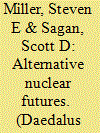

|
|
|
| 2 |
ID:
160121
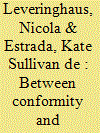

|
|
|
|
|
| Summary/Abstract |
China and India, as rising powers, have been proactive in seeking status as nuclear responsibles. Since the 1990s they have sought to demonstrate conformity with intersubjectively accepted understandings of nuclear responsibility within the global nuclear order, and have also sought recognition on the basis of particularistic practices of nuclear restraint. This article addresses two puzzles. First, nuclear restraint is at the centre of the pursuit of global nuclear order, so why have China and India not received recognition from influential members of the nuclear order for the full spectrum of their restraint-based behaviours? Second, why do China and India nonetheless persist with these behaviours? We argue that the conferral of status as a nuclear responsible is a politicised process shaped by the interests, values, and perceptions of powerful stakeholder states in the global nuclear order. China’s and India’s innovations are not incorporated into the currently accepted set of responsible nuclear behaviours because, indirectly, they pose a strategic, political, and social challenge to these states. However, China’s and India’s innovations are significant as an insight into their identity-projection and preferred social roles as distinctive rising powers, and as a means of introducing new, if nascent, ideas into non-proliferation practice and governance.
|
|
|
|
|
|
|
|
|
|
|
|
|
|
|
|
| 3 |
ID:
109804
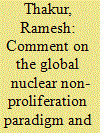

|
|
|
|
|
| Publication |
2012.
|
| Summary/Abstract |
Rajiv Nayan's article is both important and interesting. It is important because nuclear weapons pose a threat to humanity and the planet that in magnitude, severity and immediacy is the gravest of all known risks confronting us today.
|
|
|
|
|
|
|
|
|
|
|
|
|
|
|
|
| 4 |
ID:
094473
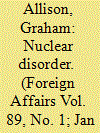

|
|
|
|
|
| Publication |
2010.
|
| Summary/Abstract |
The global nuclear order today could be as fragile as the global financial order was two years ago, when conventional wisdom declared it to be sound, stable, and resilient. In the aftermath of the 1962 Cuban missile crisis, a confrontation that he thought had one chance in three of ending in nuclear war, U.S. President John F. Kennedy concluded that the nuclear order of the time posed unacceptable risks to mankind. "I see the possibility in the 1970s of the president of the United States having to face a world in which 15 or 20 or 25 nations may have these weapons," he forecast. "I regard that as the greatest possible danger." Kennedy's estimate reflected the general expectation that as nations acquired the advanced technological capability to build nuclear weapons, they would do so. Although history did not proceed along that trajectory, Kennedy's warning helped awaken the world to the intolerable dangers of unconstrained nuclear proliferation.
|
|
|
|
|
|
|
|
|
|
|
|
|
|
|
|
| 5 |
ID:
159001
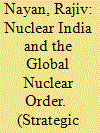

|
|
|
|
|
| Summary/Abstract |
The 1998 nuclear tests conducted by India heralded yet another nuclear age. The instant response of a section of the international community was highly pessimistic. It foresaw regional instability, collapse of the global nuclear order and serious crisis in the global nuclear non-proliferation regime. As a result, overlooking India’s security imperatives, a number of countries reacted with hostility against the Indian nuclear tests. Even international organisations were mobilised against India. However, the two decades of India’s nuclearisation appear to have falsified the prediction of doomsayers. On the contrary, India has assumed the mantle of stabilising the global nuclear order and enhancing its own security in the process. Although it has not joined the Nuclear Non-Proliferation Treaty (NPT), it has accepted the norms of non-proliferation. It is promoting non-proliferation and has joined different institutions associated with it. Concurrently, the international community has also started integrating and accommodating India in the global nuclear order in general and the non-proliferation regimes in particular.
|
|
|
|
|
|
|
|
|
|
|
|
|
|
|
|
| 6 |
ID:
159000
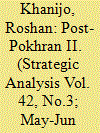

|
|
|
|
|
| Summary/Abstract |
Post-Pokhran II the global nuclear environment has changed both in terms of developing niche technologies as also the nuclear strategies. Apart from the traditional challenges, there are new threats emerging in the form of cyber, space, hypersonic glide vehicles, nuclear terrorism, etc. The development of multiple nuclear dyads and triads further makes the security environment increasingly complex, as nations now have to deal with multiple nuclear problems and adversaries. While India has continued its progress in the nuclear domain since 1998, focused critique is necessary to ensure that India’s posture remains relevant and efficient in safeguarding sovereign interests. This article, thus, tries to analyse some of these issues and recommends that India needs to review its nuclear doctrine.
|
|
|
|
|
|
|
|
|
|
|
|
|
|
|
|
| 7 |
ID:
163365
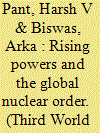

|
|
|
|
|
| Summary/Abstract |
The global nuclear order has been built around the Treaty on the Non-Proliferation of Nuclear Weapons (NPT), primarily aimed at addressing the challenges of nuclear non-proliferation. In the last two decades, this order has faced growing challenges from the demands of emerging nuclear powers which it has been unable to meet effectively. These powers have either been outside the order, like India, Israel and Pakistan, or withdrawn from it, like North Korea, or could leave in future due to arguably compelling security concerns, like Iran, Japan and South Korea. These nations and the challenges they pose to the global nuclear order are mostly considered unique and are treated as exceptional. This paper examines the case of India which has found partial acceptance into the extant order from being a pariah nuclear state outside the NPT to a de facto nuclear weapon state designated by the US–India civil nuclear cooperation pact of 2008. It explicates the ongoing process of its integration into the order, underlining why this task remains daunting. Other than factors unique to India, the case of its rise in the global nuclear order captures the structural shortcomings of the extant order. While these underlying shortcomings remain, new nuclear powers, with or without support from the established ones, are likely to challenge the order in future.
|
|
|
|
|
|
|
|
|
|
|
|
|
|
|
|
| 8 |
ID:
187485
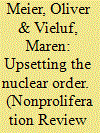

|
|
|
|
|
| Summary/Abstract |
Nationalist populists as leaders of states that possess nuclear weapons undermine the nuclear order and increase nuclear dangers in novel, significant, and persistent ways. Such leaders talk differently about nuclear weapons; they can put nuclear policy making and crisis management in disarray; and they can weaken international alliances and multilateral nuclear institutions. The rise of nationalist populists in nuclear-armed states, including some of the five nuclear-weapon states recognized under the 1968 Treaty on the Nonproliferation of Nuclear Weapons, shatters the presumed distinction between responsible and irresponsible nuclear powers and complicates attempts to heal rifts in the international order. Policies to wait out populists or to balance their influence in multilateral institutions seem to have had limited success. A sustainable strategy to deal with the challenge posed by populists would need to start by recognizing that we can no longer assume that nuclear weapons are safe in the hands of some states but not in others’.
|
|
|
|
|
|
|
|
|
|
|
|
|
|
|
|
|
|
|
|
|